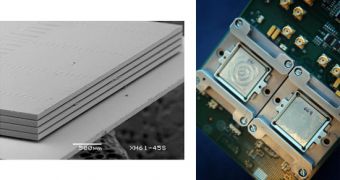Intel has been busy at this year's IDF event, speaking of many things, even a certain memory solution that is supposedly vastly superior to existing DRAM chips.
People probably know that the DRAM segment hasn't been doing too well over the past year, since demand remained weak, causing repeated price drops.
The last time we talked about this situation was actually yesterday, when at least some hope held out in how some spot prices grew, even if it wasn't enough to make a difference.
Intel might be intent on using somewhat more aggressive means of revitalizing this market, with help from Micron.
Since Ultrabooks are seen as a real game changing initiative on the laptop front, the Santa Clara, California-based company might want to use a similar tactic on memory.
That said, Intel and Micron demonstrated a concept called Hybrid Memory Cube (HMC), named such for its shape (obviously).
A stacked memory chip configuration relies on a highly efficient interface which supports data rates of 1 Tb/s (one trillion bits per second), all the while keeping energy use low.
All in all, the memory cube promises a tenfold increase in bandwidth and an energy efficiency about seven times as good as the best DDR3 module of today.
“We knew that future high-speed memory will need to conquer a challenging set of tradeoffs and achieve low cost and power as well as high density and speed. We came to the conclusion that mating DRAM and a logic process based I/O buffer using 3D stacking could be the way to solve the dilemma,” said Bryan Casper, an Intel official.
“We found out that once we placed a multi-layer DRAM stack on top of a logic layer, we could solve another memory problem which limits the ability to efficiently transfer data from the DRAM memory cells to the corresponding I/O circuits.”
More than consumer devices, data centers and supercomputers are seen as the type of installations that will most benefit from this invention.

 14 DAY TRIAL //
14 DAY TRIAL //